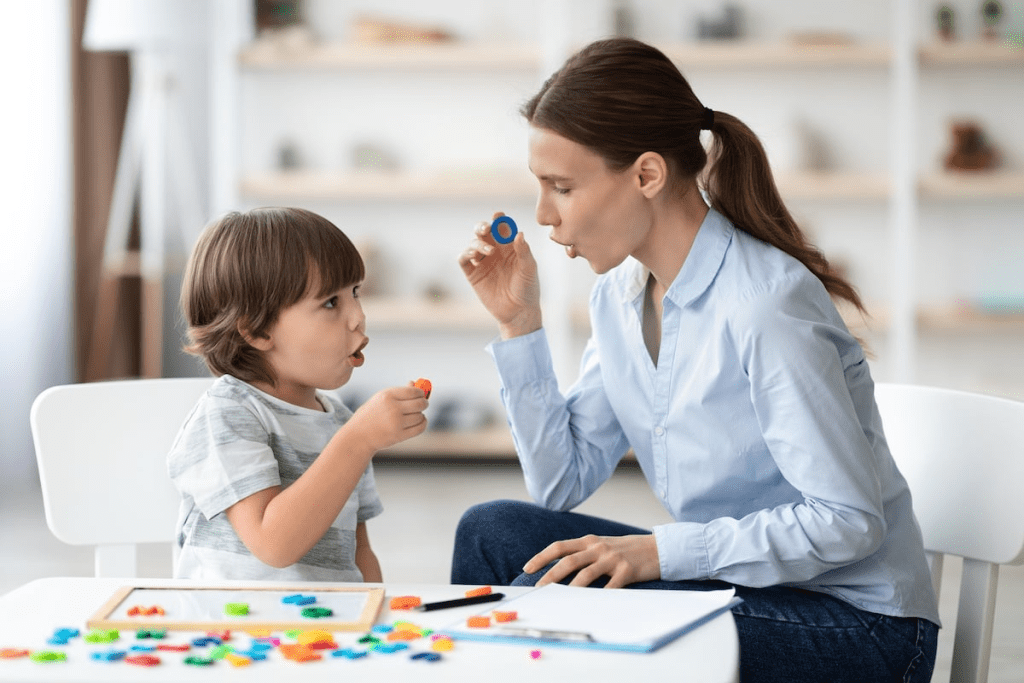Last Updated on November 14, 2025 by
Detecting developmental delays early is key to timely support. As caregivers, we aim for the best for our kids. Spotting issues early can greatly help.

Early detection lets us start targeted interventions right away. These are based on clinical and ethical standards. We’ll look at early signs of delays and how to spot them fast. You’ll get great developmental ideas to help your child grow.Like with current outbreaks of cholera, detecting developmental delays early is critical. Learn the best ways to spot signs for fast
It’s important to understand developmental delays to help children reach their milestones. These delays happen when kids don’t meet certain goals on time. Many things can cause this.
Delays can show up in different ways, like in physical, language, social, and thinking skills. Knowing the type of delay helps find the right help.
There are several types of developmental delays:
Parents can help at home by creating a daily routine. This makes kids feel safe and helps them know what to expect. Activities like reading, puzzles, and play also help.
Finding developmental delays early is key. It lets us start helping kids sooner. Studies show early help can really make a difference.
Spotting delays early means we can work with doctors to make a plan. This might include therapies and ways to support kids at home. This includes how to help a child with a developmental delay at home.
It’s important for parents and caregivers to spot early signs of developmental delays. These delays happen when a child misses milestones. Catching these issues early can really help with support.
There are key areas to watch for delays. We’ll look at these areas and the signs that mean a child might need help.
Physical skills include big movements like walking and small ones like holding things. Red flags are if a child has trouble with balance or can’t sit or stand without help.
Language skills are about understanding and talking. Warning signs are if a child doesn’t babble by 9 months or doesn’t say words by 16 months. Kids with autism might have big trouble with talking and understanding.

Social and emotional skills are about interacting and feeling emotions. Red flags are if a child avoids eye contact or doesn’t seem to care about others. These issues can make it hard for kids to connect with others.
Cognitive skills are about solving problems and learning. Warning signs are if a child has trouble solving problems or seems not to care about their world. Finding these issues early can help a lot.
Knowing these signs can help parents get help early. Early support can really help kids with developmental delays.
“Early intervention can significantly impact the development and future outcomes of children with developmental delays.”
Pediatrician
Knowing the typical developmental milestones at different ages is key for parents. It helps them spot any delays early. This way, they can get help if their child is not meeting these milestones.
Babies grow fast in the first year. By the end, they can lift their heads while on their stomachs, respond to sounds, and make cooing sounds. They also start to track moving objects with their eyes. If they don’t respond to sounds or make eye contact, it might be a sign of a delay, possibly related to global delay or autism.
Toddlers are full of curiosity and grow fast. By 2, they can walk on their own, say a few words, and point to body parts. They also enjoy playing interactive games. If they struggle with language or social skills, it could be a sign of a problem.

Preschoolers keep improving their language, social, and thinking skills. By 4, they can use simple sentences, dress themselves, and understand basic concepts like counting. They also start to play better with others. If they show delays in these areas, it’s time to check further.
At school age, kids should have more advanced skills. They should be able to follow instructions, make friends, and understand school subjects. If they struggle with these, it might mean they need help.
Knowing these milestones helps parents spot delays early. Early action is key to helping a child grow and live a better life.
Understanding global health is key. We must see how environmental changes and disease outbreaks affect kids. For example, the current outbreaks of cholera can harm children’s health and growth.
Conditions like global developmental delay and autism spectrum disorder affect kids’ growth. Studies show that global health issues can raise the risk of these conditions. Exposure to harmful toxins, for example, can lead to developmental delays.
“Early detection is key to supporting children with developmental delays.” We believe in this, making sure kids get the help they need to succeed despite health challenges.
Environmental and health factors greatly impact child development. Exposure to pollutants, poor nutrition, and diseases like cholera can slow growth. It’s important for parents and caregivers to know these risks and act to prevent them.
By grasping how global health factors affect kids, we can help more children and families. Our goal is to provide top-notch healthcare and support. We aim to meet the complex needs of kids with developmental delays and other conditions.
After finding out about developmental delays, it’s key to support your child. We offer tips and strategies to help at home. Working with healthcare pros, parents can make a supportive space for their child’s growth.
Creating a caring home environment is crucial for a child’s progress. Small changes, like a daily routine and talking more, help kids with global delay autism or other delays. We aim to offer support and guidance to families facing these challenges.
Knowing the signs of developmental delays and acting early can greatly help your child. Our team is committed to top-notch healthcare and support for families. We ensure families get the care they need.
Early signs of developmental delays include physical, language, social, and cognitive delays. Look out for not responding to sounds or their name. Also, not making eye contact or not sitting or walking on time are red flags.
To support a child with developmental delay at home, create a nurturing environment. Use a daily routine and positive reinforcement. Engage in activities that help with cognitive and physical development.
Global developmental delay and autism spectrum disorder are related but different. Global developmental delay means significant delays in many areas. Autism spectrum disorder is a disorder that affects social interaction and communication. Some children with global developmental delay may also have autism spectrum disorder.
Environmental and health factors, like toxins and malnutrition, can cause developmental delays. Global health issues, like cholera outbreaks, can also impact child development. This is especially true in areas with limited healthcare access.
Developmental milestones change with age. Watch for sitting and walking in infancy, language development in toddlerhood, and social and cognitive skills in preschool age. Knowing these milestones helps you spot potential delays and seek help.
To support your child’s development, work closely with healthcare professionals. Create a personalized plan that meets their specific needs. This plan can include therapies, interventions, and home support strategies.
COPA Kids. (2024, November 4). Why is early detection of developmental delays crucial? https://copakids.com/child-healthcare-news/why-early-detection-of-developmental-delays-is-crucial/
Centers for Disease Control and Prevention. (2025, January 27). CDC’s Learn the Signs: Identifying developmental delays. https://www.zerotothree.org/resource/journal/cdcs-learn-the-signs-act-early-developmental-milestone-resources-to-improve-early-identification-of-children-with-developmental-delays-disorders-and-disabilities/
Khandare, S., et al. (2024). Early detection of global developmental delay in infants using Indian screening tools: Insights from a tertiary care hospital. International Journal of Health Sciences and Research, 14(5). https://www.ijhsr.org/IJHSR_Vol.14_Issue.5_May2024/IJHSR53.pd
Subscribe to our e-newsletter to stay informed about the latest innovations in the world of health and exclusive offers!